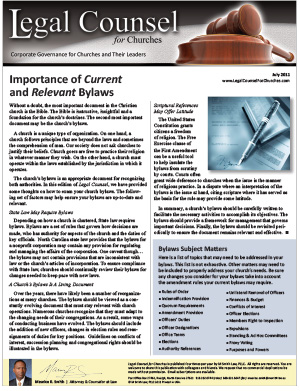Without a doubt, the most important document in the Christian church is the Bible. The Bible is instructive, insightful and a foundation for the church’s doctrines. The second most important document may be the church’s bylaws.
A church is a unique type of organization. On one hand, a church follows principles that are beyond the laws and sometimes the comprehension of man. Our society does not ask churches to justify their beliefs. Church goers are free to practice their religion in whatever manner they wish. On the other hand, a church must operate within the laws established by the jurisdiction in which it operates.
The church’s bylaws is an appropriate document for recognizing both authorities. In this edition of Legal Counsel, we have provided some thoughts on how to exam your church bylaws. The follow- ing set of factors may help ensure your bylaws are up-to-date and relevant.
State Law May Require Bylaws
Depending on how a church is chartered, State law requires bylaws. Bylaws are a set of rules that govern how decisions are made, who has authority for aspects of the church and the duties of key officials. North Carolina state law provides that the bylaws for a nonprofit corporation may contain any provision for regulating and managing the affairs of the corporation. One caveat though… the bylaws may not contain provisions that are inconsistent with law or the church’s articles of incorporation. To ensure compliance with State law, churches should continually review their bylaws for changes needed to keep pace with new laws.
A Church’s Bylaws Is A Living Document
Over the years, there have likely been a number of reorganiza- tions at many churches. The bylaws should be viewed as a con- stantly evolving document that must stay relevant with church operations. Numerous churches recognize that they must adapt to the changing needs of their congregations. As a result, some ways of conducting business have evolved. The bylaws should include the addition of new officers, changes in election rules and reas- signments of duties for key positions. Guidelines on conflicts of interest, succession planning and congregational rights should be illustrated in the bylaws.
Scriptural References May Offer Latitude
The United States Constitution grants citizens a freedom of religion. The Free Exercise clause of the First Amendment can be a useful tool to help insulate the bylaws from scrutiny by courts. Courts often grant wide deference to churches when the issue is the manner of religious practice. In a dispute where an interpretation of the bylaws is the issue at hand, citing scripture where it has served as the basis for the rule may provide some latitude.
In summary, a church’s bylaws should be carefully written to facilitate the necessary activities to accomplish its objectives. The bylaws should provide a framework for management that governs important decisions. Finally, the bylaws should be revisited peri- odically to ensure the document remains relevant and effective.
Bylaws Subject Matters
Here is a list of topics that may need to be addressed in your bylaws. This list is not exhaustive. Other matters may need to be included to properly address your church’s needs. Be sure any changes you consider for your bylaws take into account the amendment rules your current bylaws may require.
- Rules of Order
- Indemnification Provision
- Quorum Requirements
- Amendment Provision
- Officers’ Duties
- Officer Designations
- Office Terms
- Elections
- Authority References
- Unilateral Removal of Officers
- Finances & Budget
- Conflicts of Interest
- Officer Elections
- Members Right to Inspection
- Expulsions
- Standing & Ad Hoc Committees
- Proxy Voting
- Purposes and Powers

